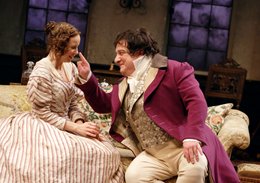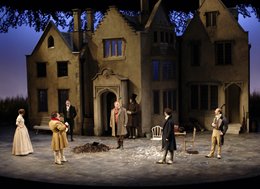For those who know Boucicault only for his exaggeratedly Irish plays, The Colleen Bawn, Arrah-na-Pogue, and The Shaughraun, London Assurance may come as a bit of a shock, for there is nothing easily identifiable as Irish about it. It’s a town and country comedy, set between the English capital and Gloucestershire, that lightly sends up the pretensions of the class system but has mainly served, from the time it was written (the early 1840s) forward, as a vehicle for star-turn performances.
 These are delightfully provided here by Simon Russell Beale as the self-deluding, middle-aged fop Sir Harcourt Courtly, and Fiona Shaw as (wait for it) Lady Gay Spanker, a strapping country horsewoman who turns Sir Harcourt’s head just as he has determined to marry Grace Harkaway (Michelle Terry), a wealthy heiress at least 30 years his junior. The character names alone give an impression of potential camp value in this material, but Nicholas Hytner renders his production all the funnier by taking its comedy seriously. This is not a contemporary production having a laugh at a silly, distanced world, but one that rather allows the material to be hilarious in its own right and on its own terms - which means, largely through character and characterisation.
These are delightfully provided here by Simon Russell Beale as the self-deluding, middle-aged fop Sir Harcourt Courtly, and Fiona Shaw as (wait for it) Lady Gay Spanker, a strapping country horsewoman who turns Sir Harcourt’s head just as he has determined to marry Grace Harkaway (Michelle Terry), a wealthy heiress at least 30 years his junior. The character names alone give an impression of potential camp value in this material, but Nicholas Hytner renders his production all the funnier by taking its comedy seriously. This is not a contemporary production having a laugh at a silly, distanced world, but one that rather allows the material to be hilarious in its own right and on its own terms - which means, largely through character and characterisation.
This was Boucicault’s first produced play, written when he was just 21 for the Theatre Royal, Covent Garden, and reworked considerably in rehearsal by the author and the producer/actors Charles Mathews and Madame Vestris, who were the biggest theatrical stars of their day. Mathews played Dazzle, the trickster figure who in the later plays would be Irish (Conn in The Shaughraun, Myles-na-Coppaleen in The Colleen Bawn) but here is a lower-class English lad who easily bluffs his way into this social milieu and stirs up much of the good-natured trouble that fuels the play’s comedy. Matt Cross downplays the character here as a rather harmless Cockney wide boy; the interest in Hytner’s production is not in the social role-playing and commentary that Dazzle represents, but rather in the dazzling personalities that surround him.
.jpg.aspx%3Fwidth=199&height=260) None more dazzling than Russell Beale’s Sir Harcourt, who, with his jowls pushed forward by a too-tight ruff, a line of black-dyed spit curls dancing across his forehead, and sporting more evident makeup than any of the female characters, comes across like a posturing, über-fey version of Humpty Dumpty. Russell Beale made his name in classic comedies but has since become better known as a tragedian; here he takes every opportunity to strut his old comic stuff – or rather, mince it, in gleaming, improbably tiny black pumps. The character’s so femme that one fears at first that they might be going for the obvious and playing him as gay - but it quickly becomes clear that the attention to grooming and personal presentation is evidence of Sir Harcourt’s massive self-absorption. Though much of the plot spins around whom he might marry, sexual desire doesn’t come into it – the only person he’s in love with is himself.
None more dazzling than Russell Beale’s Sir Harcourt, who, with his jowls pushed forward by a too-tight ruff, a line of black-dyed spit curls dancing across his forehead, and sporting more evident makeup than any of the female characters, comes across like a posturing, über-fey version of Humpty Dumpty. Russell Beale made his name in classic comedies but has since become better known as a tragedian; here he takes every opportunity to strut his old comic stuff – or rather, mince it, in gleaming, improbably tiny black pumps. The character’s so femme that one fears at first that they might be going for the obvious and playing him as gay - but it quickly becomes clear that the attention to grooming and personal presentation is evidence of Sir Harcourt’s massive self-absorption. Though much of the plot spins around whom he might marry, sexual desire doesn’t come into it – the only person he’s in love with is himself.
We have to wait for his comic counterpart: Lady Gay doesn’t pitch up until at least 40 minutes into the action, but Shaw makes up for lost time as soon as she steams onstage in tartan riding gear and ludicrous period hairstyle – two bunches of cascading curls framing her face like big floppy dog’s ears. At first, again, an easy contemporary gag could be played here thanks to the character’s name and Shaw’s somewhat butch body language (lots of hands on hips and thigh-slapping), but the characterisation is all the more interesting because she’s played at face value, as a hunt-loving, big-hearted, notably clever woman, full of the joys of spring and ready to play along with Sir Harcourt’s flirtations for the laugh (while remaining admirably loyal to her elderly husband, played by Richard Briers in a pricelessly doddery cameo).
The most interesting and unexpected politics here, in fact, are feminist: the women in the play are always miles ahead of the men. The joke in the character of Grace, particularly as Terry plays her, is that she’s no shrinking violet but a straight-talker who’s resigned to marrying a much older man as the most pragmatic choice for her future. She is pleasantly surprised, but never totally bowled over, when she is romanced by Sir Harcourt’s feckless son Charles (Paul Ready) who, in one of the play’s many loveable ridiculousnesses, arrives down the country and manages to convince his own father that he’s someone other than himself.
 Space does not permit explication here of all the plot’s silly twists and turns, nor are these particularly important. The point is that everyone seems to be having an absolute ball on this production, from designer Mark Henderson (who gets to lay on loads of taxidermised animal heads for the country house scenes and play with the Olivier’s famed revolving stage) to performers in smaller roles including Nick Sampson, whose disdain as the snooty butler Cool practically precedes him into any room he enters, to the leading actors themselves, who often appear on the brink of corpsing but are playing with such generosity that this feels inclusive rather than distancing.
Space does not permit explication here of all the plot’s silly twists and turns, nor are these particularly important. The point is that everyone seems to be having an absolute ball on this production, from designer Mark Henderson (who gets to lay on loads of taxidermised animal heads for the country house scenes and play with the Olivier’s famed revolving stage) to performers in smaller roles including Nick Sampson, whose disdain as the snooty butler Cool practically precedes him into any room he enters, to the leading actors themselves, who often appear on the brink of corpsing but are playing with such generosity that this feels inclusive rather than distancing.
This is not a great play, but it shows Boucicault refining a skill for plotting and characterisation that would come to full fruition in the Irish-themed plays. It’s a brilliant vehicle for National Theatre artistic director Hytner, who’s at his best directing large-cast, large-scale works, and it has become an unexpected and much-needed hit for the National, whose programming in the past 18 months has been eclipsed by that of the smaller subsidised houses, in particular the Royal Court. 170 years on and in a form unfamiliar to contemporary Irish audiences, the entertainment and box office magic of Boucicault, “the Irish theatre’s first international superstar” (as Chris Morash has him), strikes again.
Karen Fricker lectures in contemporary theatre at Royal Holloway, University of London and is deputy London theatre critic for Variety (US).